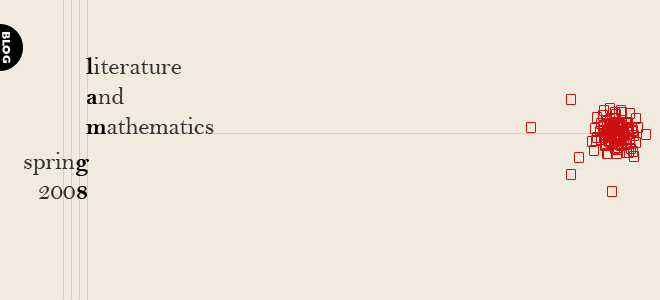I was thinking more recently about the role of religion in some of the depictions of mathematicians that we've been looking at. They would seem to suggest that mathematicians would rather turn to a logical system for meaning than one based on faith. However, there is an interesting parallel with religion in this approach that I think is illustrated in Pi. In Max's search for meaning, the first thing he has to do is accept his initial assumptions, namely that everything can be described with mathematics and that there are patterns everywhere in nature. In all of the study of mathematics one has to accept an initial set of axioms such as these, which are not proven, and then proceed from there. This is not always similar to faith however, since they are usually simple enough to be verified adequately by everyday experience. Max's axioms, on the other hand, such as meaningful patterns existing everywhere, are deeper than most common axioms in math and thus perhaps more closely related to the idea of a faith.
Wednesday, April 16, 2008
Subscribe to:
Post Comments (Atom)

3 comments:
I don't think that logic and faith are necessarily opposed to each other. Faith is opposed to sight but not logic. Like you said, we assume axioms to be true by faith. In fact, Descartes would say that the only thing that we can know with absolute certainty is our own existence. We take everything else on a certain level of faith. And of course faith can be based in logic. Scientists knew Pluto, the planet, existed way before they saw it with a telescope because they could observe the effects that it had on the rest of the solar system. Their faith in Pluto's existence was based solely on logic.
I definitely think there is some connection between faith and logic the question is whether or not there is logic to back up the faith. The thing is everyone perceives logic in a different light and what may seem logical to me can seem completely illogical to others. In either case faith and logic in their own ways provide people with some sort of meaning in life and everyone whether or not they understand it have faith in something. For some this may mean faith in mathematical axioms while other find faith in religion. Regardless I find it highly interesting that in studying math there is the potential to break the codes of life and find some sort of meaning like Max was searching for in Pi.
Kyle I think you're using the semantics of faith and logic in different ways. Faith I believe means 'without physical evidence' essentially. I agree that in a philosophical sense, as Descartes likes to say, our senses might distort our perception of reality, and since there's no way we can know that for sure, we have to trust them somewhat on faith. However, if you're talking about observing a planet like pluto in ways other than by seeing it, I wouldn't call that taking it on faith. You have physical evidence, it just doesn't happen to be sight. Also, pluto was indeed first seen with a telescope. Its gravitational affect on the solar system can't be measured because it's tiny and really far from everything. I think the sentence 'their faith was based solely on logic' means that it wasn't faith, by definition. Faith doesn't just mean thinking something is true.
Post a Comment